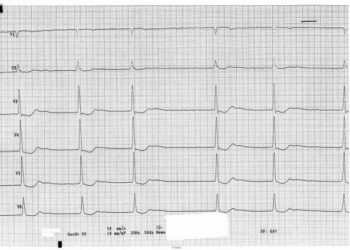Low-dose intracoronary alteplase unlikely to improve outcomes in STEMI patients treated with primary PCI
1. In this randomized controlled trial, low-dose intracoronary alteplase given early during primary percutaneous coronary intervention (PCI) for acute ST-Elevation Myocardial Infarction (STEMI) did not reduce microvascular obstruction.
2. Health related quality of life was not improved with low-dose intracoronary alteplase.
Evidence Rating Level: 1 (Excellent)
Study Rundown: Acute coronary thrombosis causes ST-Elevation Myocardial Infarction (STEMI), and primary percutaneous coronary intervention (PCI) is used to emergently reopen the occluded coronary artery with a stent. However, thrombi often embolize to distal vasculature and failed microvascular reperfusion has been estimated to occur in 45% of all patients. It is unclear if addition of low dose alteplase may aid in treatment. In this randomized controlled trial including patients with acute STEMI presenting within 6 hours of symptom onset, adjunctive low-dose intracoronary alteplase given during primary PCI did not reduce microvascular obstruction compared to placebo. There was an increase in troponin T in the alteplase groups in addition to dose-related increases in fibrin D-dimer levels, suggesting clot lysis did occur. Health related quality of life scores were not improved with this intervention compared to placebo.
Though this treatment paradigm is unlikely to significantly reduce microvascular obstruction, some limitations should be noted. First, the duration of findings were limited to 3 months and so longer term benefits of this intervention cannot be excluded. The trial was also discontinued when pre-specified futility criteria were met, and so a small effect size may have been missed. Finally, drug administration was focused at a single time point before stent implantation when coronary blood flow is variable, and it is unclear if different administration timing may have changed results.
Click to read the study in JAMA
In-Depth [randomized controlled trial]: The T-TIME study was a randomized, double-blind, clinical trial that recruited 440 patients from 11 UK hospitals and randomized them to receive alteplase 10mg, alteplase 20mg, or placebo with primary PCI. Patients with a clinical diagnosis of acute STEMI with persistent ST-segment elevation or recent left bundle-branch block with symptom onset to reperfusion time of 6 hours or less were potentially eligible for randomization. The primary outcome was the amount of microvascular obstruction (% of left ventricular mass) demonstrated by late gadolinium-enhanced magnetic resonance imaging (MRI) 10 to 15 minutes after administration of contrast media. Recruitment was discontinued early on recommendation of data and safety monitoring committee because a pre-specified futility criterion for efficacy was met. The amount of microvascular obstruction revealed by MRI did not differ between the 10-mg alteplase group (2.6% vs. 2.3%; CI95 -0.76 to 1.35%) or 20-mg alteplase group (3.5% vs. 2.3%; CI95 -0.08 to 2.41%) when compared to placebo. Compared with placebo, there was a dose-related increase in the systemic concentrations of fibrin D-dimer and prothrombin levels and a slight reduction in plasminogen in the alteplase groups (p < 0.05). Health-related quality of life scores were similar between the 20-mg alteplase and placebo groups (CI95 -0.04 to 0.04).
Image: PD
©2019 2 Minute Medicine, Inc. All rights reserved. No works may be reproduced without expressed written consent from 2 Minute Medicine, Inc. Inquire about licensing here. No article should be construed as medical advice and is not intended as such by the authors or by 2 Minute Medicine, Inc.






